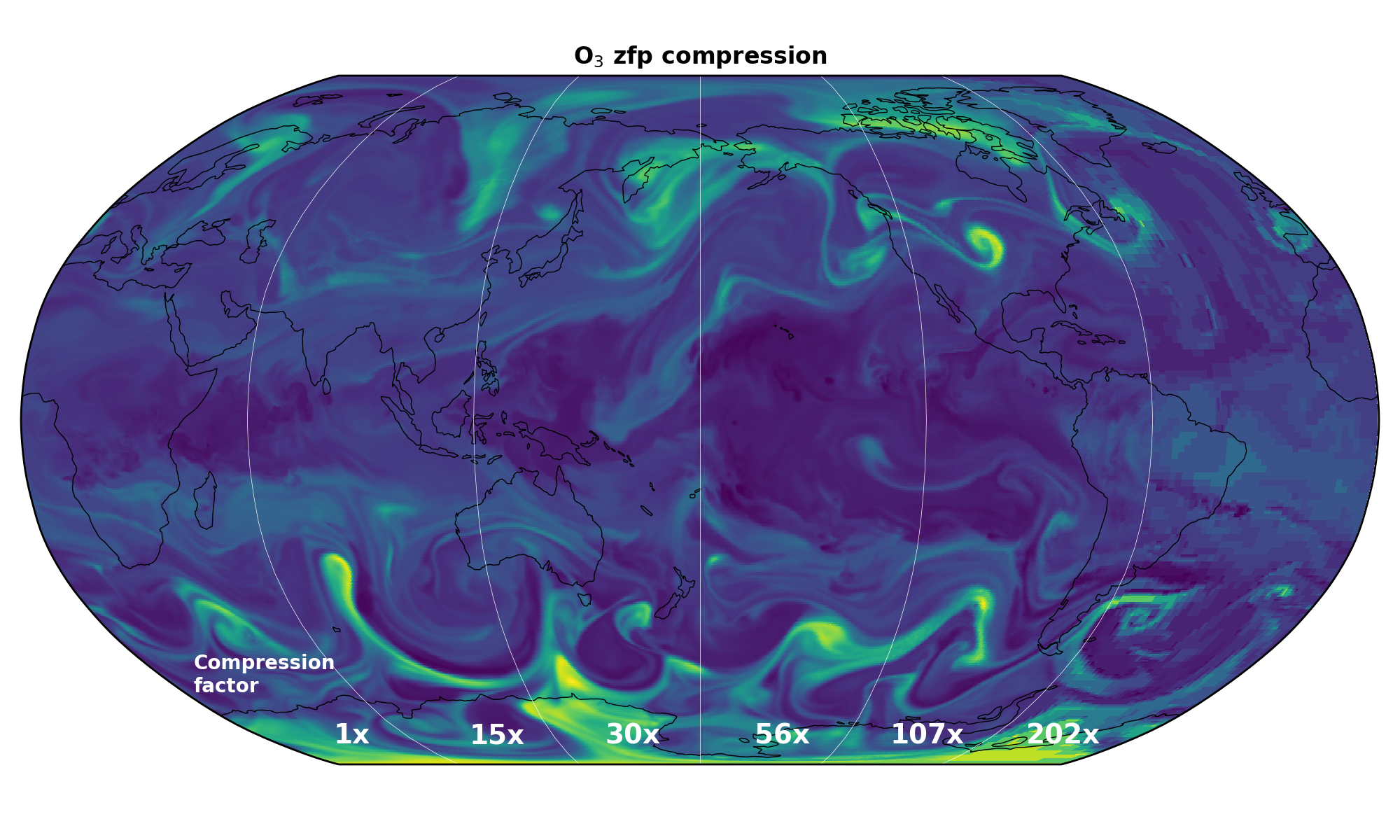Julia bindings for the data compression library zfp v0.5.5, written by P Lindstrom (@lindstro). From the zfp documentation:
zfp is an open source library for compressed numerical arrays that support high throughput read and write random access. To achieve high compression ratios, zfp generally uses lossy but optionally error-bounded compression. Bit-for-bit lossless compression is also possible through one of zfp’s compression modes.
zfp works best for 2-4D arrays that exhibit spatial correlation, such as continuous fields from physics simulations, images, regularly sampled terrain surfaces, etc. Although zfp also provides a 1D array class that can be used for 1D signals such as audio, or even unstructured floating-point streams, the compression scheme has not been well optimized for this use case, and rate and quality may not be competitive with floating-point compressors designed specifically for 1D streams.
See the documentation, or zfp's website for more information.
Requires Julia v1.3 or newer

Compression of ozone (O₃) from the CAMS data set with zfp at various levels of precision.
Compression factors are relative to 64-bit floats regarding including the vertical dimension, shown is only one vertical level.
1 to 4-D arrays of eltype Int32,Int64,Float32,Float64 can be compressed calling
the zfp_compress function.
julia> using ZfpCompression
julia> A = rand(Float32,100,50);
julia> Ac = zfp_compress(A)
16952-element Array{UInt8,1}:
0xfd
0xe1
0x80
0x8d
⋮which initializes the zfp compression, preallocates the bitstream used for
the compressed array and performs the compression. The compressed array is returned
as Array{UInt8,1}. By default, the compressed array includes a header with the required
information about the type, size and shape of the uncompressed array as well
as lossy compression parameters (see below). This header can be deactivated with
julia> Ac = zfp_compress(A,write_header=false)A compressed array (with header) can be decompressed as
julia> Ad = zfp_decompress(Ac)Alternatively, the decompression of header-less compressed arrays can be performed into an existing array (with same type, size and dimensions as the uncompressed array)
julia> Ad = similar(A)
julia> zfp_decompress!(Ad,Ac)In this lossless example the compression is reversible
julia> A == Ad
trueLossy compression is achieved by specifying additional keyword arguments
for zfp_compress, which are tol::Real, precision::Int, and rate::Real.
If none are specified (as in the example above) the compression is lossless
(i.e. reversible). Lossy compression parameters are
toldefines the maximum absolute error that is tolerated.precisioncontrols the precision, bounding a weak relative error, see this FAQratefixes the bits used per value.
Only one of tol, precision or rate should be specified. For further details
see the zfp documentation.
If we can tolerate a maximum absolute error of 1e-3, we may do
julia> Ac = zfp_compress(A,tol=1e-3)
9048-element Array{UInt8,1}:
0xff
0x2c
0x01
0x1a
0xf3
0xbc
0xea
0xbb
0xc6
0xd4
⋮which clearly reduces the size of the compressed array. In this case the maximum absolute error is limited to about 3e-4.
julia> A2 = zfp_decompress(Ac)
julia> maximum(abs.(A2 - A))
0.00030493736f0For header-less compression, it is essential to provide the same compression
parameters also for zfp_decompress!. Otherwise the decompressed array is flawed. E.g.
julia> A2 = similar(A)
julia> zfp_decompress!(A2,Ac,tol=1e-3)You can use compress in parallel using the nthreads argument of zfp_compress to trigger multi-threading via OpenMP.
No parallel decompression is currently (zfp v0.5.5) provided in the underlying C library.
On linux, zfp_jll is automatically built with OpenMP enabled,
on macOS this is not supported by default.
julia> zfp_compress(temp,nthreads=8)Compressing a 590MB array A with precision=10 is benchmarked (@btime) as
| Number of threads | 1 | 2 | 4 | 8 | 16 | 32 |
|---|---|---|---|---|---|---|
| Time | 2.45s | 1.46s | 0.73s | 0.38s | 0.25s | 0.20s |
| Speed-up | 1x | 1.7x | 3.4x | 6.4x | 9.8x | 12.3x |
ZfpCompression.jl is registered in the Julia Registry, so simply do
julia>] add ZfpCompressionand the C library is installed and built automatically.